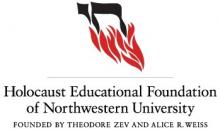Taking place in Prague, Czech Republic, the 2023 Lessons & Legacies Conference will be the first to be conducted in East-Central Europe, a region in which Nazi occupation and racial policies intersected with competing nationalisms, shifting borders, and the sovereignty of new nation states. It will be the second European iteration of the conference series, after the 2019 Lessons & Legacies Conference in Munich.
Taking its location as a point of departure, but not limiting the geographical scope of conference presentations, we invite proposals that investigate the crossings of boundaries of various kinds, including national and group or community histories as well as scholarly disciplines. Combining a thematic and a methodological track, the Prague Lessons & Legacies Conference aims to promote scholarly debate on the manifold divides and connections that exist in Holocaust studies.
The conference is not open to the public, but you can attend the keynote by Ben Frommer, for more information and registration form see https://www.mua.cas.cz/cs/udalost/ben-frommer-ghetto-without-walls
Sponsored by the Holocaust Educational Foundation of Northwestern University, Center for Holocaust Studies at the Leibniz Institute for Contemporary History, the German Federal Agency for Civic Education, Masaryk Institute and Archives of the Czech Academy of Sciences, and the Charles University, the conference invites proposals for papers, panels, and workshops. Proposals should relate to recent issues and advances in Holocaust scholarship, Holocaust education, and Public History and should conform broadly to the two tracks of the conference:
- Situating the history of the persecution, exclusion and flight, deportation, and murder of Jews and Roma on a broader map of ethnic and other cleavages and conflicts in East-Central Europe and beyond, remains a research challenge and a point of contention in public debate. Probing sites of competing victimhood, the study of the Holocaust faces the question of how to fruitfully integrate the histories of occupation, national histories of antisemitism, racism and ethnic conflict. We welcome proposals that address and incorporate the histories of migration, including refugees and displaced persons, or which challenge the often prevalent methodological nationalism of history writing. This thematic track aims to place the Holocaust and its aftermath in its wider contexts and to engage with the variety of histories of exclusionary processes and mass violence in diverse societies. It may include analyses of how this troubled past is used or weaponized in recent conflicts.
- The methodological track aims to probe and challenge disciplinary boundaries in order to advance multidisciplinary inquiries into the Holocaust. We invite proposals examining the connection of Holocaust Studies to a variety of other research fields and disciplines, including, but not limited to social sciences, culture, and memory studies. This track includes the exploration of methodological connections when it comes to placing the Holocaust into the context of social, cultural, linguistical, and ethnic diversity to colonial, postcolonial and decolonial studies. We welcome contributions from the field of digital humanities, digital history, and the emerging quantitative studies on the Holocaust, using large prosopographic and other datasets. We also welcome papers that challenge both established and new disciplinary approaches to the study of the Holocaust.
Program Committee:
- Ildikó Barna (Eötvös Loránd University)
- Sarah Cushman (Holocaust Educational Foundation of Northwestern University)
- Michal Frankl (Masaryk Institute and Archives, Czech Academy of Sciences)
- Hana Kubátová (Charles University)
- Zuzana Schreiberová (Multicultural Center Prague)
- Anna Ullrich (Center for Holocaust Studies at the Leibniz Institute for Contemporary History)
- Amy Wlodarski (Dickinson College)
- Florian Zabransky (Federal Agency for Civic Education)
Questions can be addressed to lessons@mua.cas.cz.




